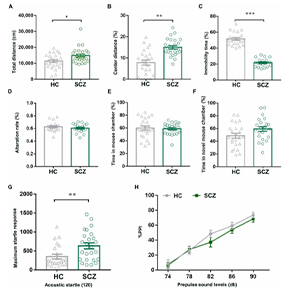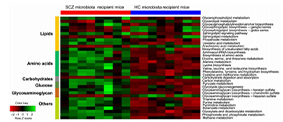
Quantitative Analysis of Neurotransmitters
Quantitative Analysis of Energy Metabolism
Quantitative Analysis of Short-Chain Fatty Acids
Quantitative Analysis of Fatty Acids
Quantitative Analysis of Bile Acids
Quantitative Analysis of Trimethylamine Oxide and Related Metabolites
Quantitative Analysis of Amino Acids
Quantitative Analysis of Neurotransmitters
Quantitative Analysis of Organic Acids
Quantitative Analysis of Flavonoids
Quantitative Analysis of Carbohydrates
Quantitative Analysis of Plant Hormones
Quantitative Analysis of Carotenoids
Quantitative Analysis of Tannins
Quantitative Analysis of Phenolic Acids
Quantitative Analysis of Anthocyanins
Neurotransmitters are specific chemicals that act as "messengers" in synaptic transmission, referred to as transmitters. They are biologically and pharmacologically active chemicals that are released when messages or impulses are transmitted between nerve cells. There are two types of transmitters: (1) peripheral transmitters, which are released from neuromuscular junctions, peripheral ganglia and vegetative nerve endings innervating visceral tissues; (2) central transmitters, which are released from the central nervous system. With the development of neurobiology, a large number of neuroactive substances have been discovered in the nervous system one after another.

Journal: Science Advances mpact factor: 13.116 Published date: May, 2019 Published by: The First Affiliated Hospital of Chongqing Medical University
Schizophrenia (SCZ) is a devastating mental disorder with poorly defined underlying molecular mechanisms. The gut microbiome can modulate brain function and behaviors through the microbiota-gut-brain axis. Here, we found that unmedicated and medicated patients with SCZ had a decreased microbiome α-diversity index and marked disturbances of gut microbial composition versus healthy controls (HCs).
Several unique bacterial taxa (e.g., Veillonellaceae and Lachnospiraceae) were associated with SCZ severity. Compared to HCs, germ-free mice receiving SCZ microbiome fecal transplants had lower glutamate and higher glutamine and GABA in the hippocampus and displayed SCZ-relevant behaviors similar to other mouse models of SCZ involving glutamatergic hypofunction.

Compared with the healthy control (HC) , the α-diversity of the intestinal flora in schizophrenia (SCZ) patients decreased significantly, and the composition of the SCZ flora increased by 23 Otu, 54 OTU of Tricholaceae were down-regulated.
Seven OTUs related to the severity of SCZ were identified, which could accurately distinguish SCZ from HC, with AUC=0.769.

The mice transplanted with SCZ flora and the mice transplanted with HC flora have different performance after behavioral experiments,such as the open field experiment, the forced swimming experiment, and the Y-maze test.

Compared with HC, mice transplanted with SCZ flora exhibited SCZ-related behaviors, with lower levels of glutamate, higher levels of glutamine and GABA in the hippocampus, amino acid and lipid metabolism pathways in the gut-brain axis were altered.

SCZ microflora can change neurochemistry and neurofunction, which may be related to the pathology of SCZ.
Zheng Peng,Zeng Benhua,Liu Meiling et al. The gut microbiome from patients with schizophrenia modulates the glutamate-glutamine-GABA cycle and schizophrenia-relevant behaviors in mice.[J] .Sci Adv, 2019, 5: eaau8317
 © Copyright 2015-2022 Suzhou PANOMIX Biomedical Tech Co.,Ltd
© Copyright 2015-2022 Suzhou PANOMIX Biomedical Tech Co.,Ltd